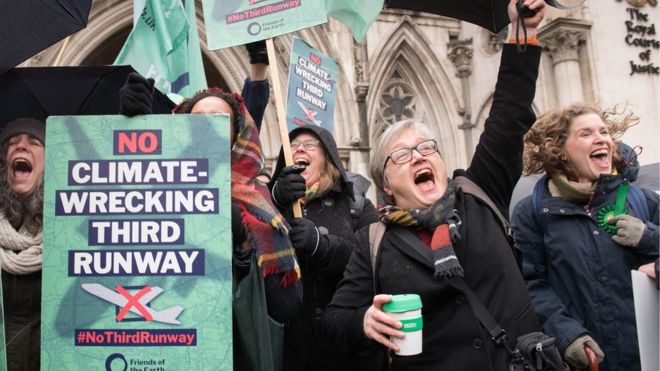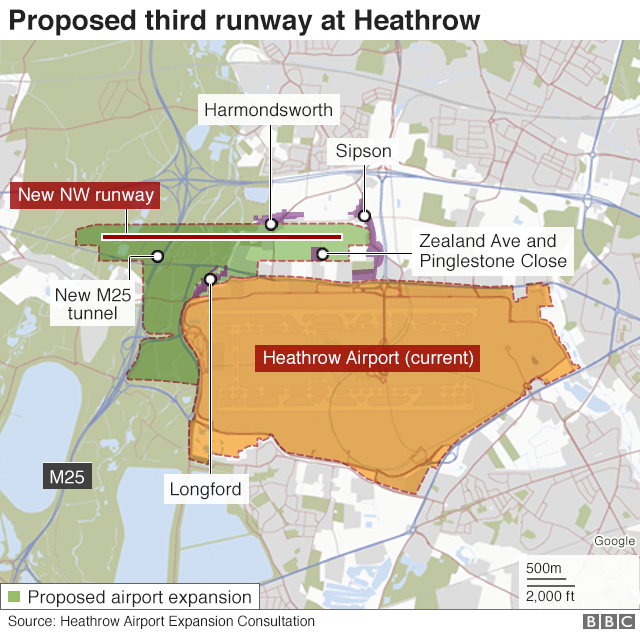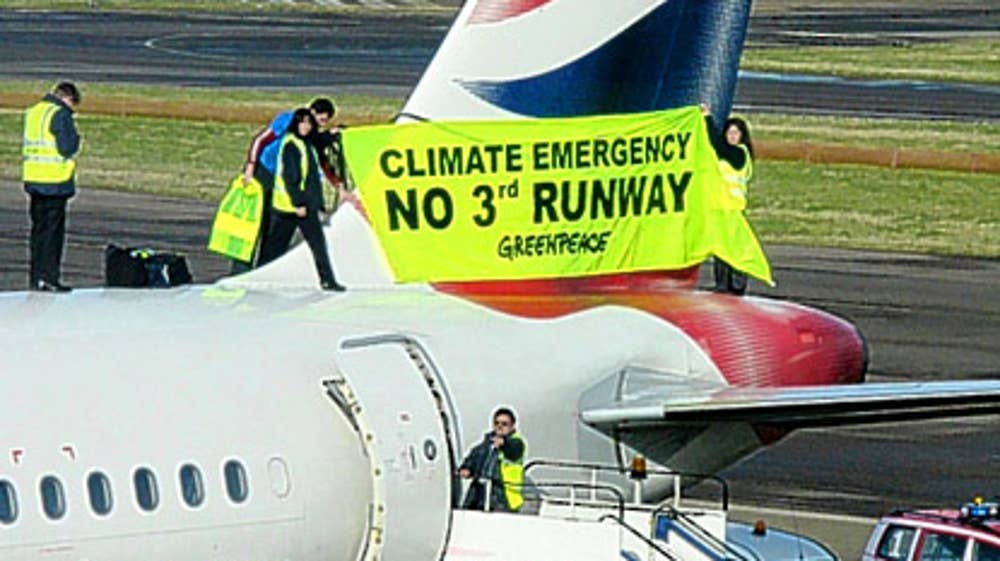“Heathrow third runway ruled illegal over climate change.”
Imagine when we all start taking the Paris Agreement into account… https://t.co/7ostsjadKF— Greta Thunberg (@GretaThunberg) February 27, 2020

Campaigners have won a Court of Appeal ruling over controversial plans for a third runway at Heathrow Airport on environmental grounds. A group of councils in London affected by the expansion, environmental charities including Greenpeace, Friends Of The Earth and Plan B, and Mayor of London Sadiq Khan, brought legal action over the Government’s approval of the plans. Judges singled out the former transport secretary Chris Grayling in their ruling, agreeing with lawyers for the campaign groups that he had not enough consideration was given to the environment in his plans.
Lord Justice Lindblom said: “The Paris agreement ought to have been taken into account by the secretary of state. The national planning statement was not produced as the law requires.”
“It’s now clear that our governments can’t keep claiming commitment to the Paris agreement, while simultaneously taking actions that blatantly contradict it” said Tim Crosland, at legal charity Plan B, which brought the challenge. “The bell is tolling on the carbon economy loud and clear.”
The challenges were dismissed in the high court in May 2019 but the complainants took their cases to the court of appeal, which delivered its verdicts on Thursday.
Plan B argued that the Paris agreement target, which the government had ratified, was an essential part of government climate policy and that ministers had failed to assess how a third runway could be consistent with the Paris target of keeping global temperature rise as close to 1.5C as possible.
“This is an opportunity for Boris Johnson to put Heathrow expansion to bed and focus on the most important diplomatic event of his premiership, the UN climate summit in Glasgow in November,” said Lord Randall, a former Conservative MP and climate adviser to the former prime minister Theresa May. “It’s his chance to shine on the world stage.”
The ruling will have Global implications
The Paris agreement ruling is far-reaching, according to Margaretha Wewerinke-Singh, an international public law expert at Leiden University, in the Netherlands. “Its implications are global,” she said.
“For the first time, a court has confirmed that the Paris agreement temperature goal has binding effect. This goal was based on overwhelming evidence about the catastrophic risk of exceeding 1.5C of warming. Yet some have argued that the goal is aspirational only, leaving governments free to ignore it in practice.”
Prof Corinne Le Quéré, at the University of East Anglia, said: “Government needs to put climate targets at the heart all big decisions, or risk missing their own net zero objectives with devastating consequences for climate and stability. I am relieved this is finally recognised in law.”

Air travel
Air travel has opened up our world, linking distant people and places like never before. This global networking has come at a cost because flying is one of the most polluting ways to travel. Expanding airports like Heathrow when we’re trying to limit the effects of climate change doesn’t make sense. Instead, we need to make train travel cheaper and more efficient, and contain demand by making those who fly frequently pay more.
Our world has come to rely on air travel. For many people, it’s the only way to see their families and the rise of budget airlines has made foreign weekend breaks very tempting. But, given the dangers of climate change, we need to be reducing the number of planes in the sky, not making space for more by expanding airports.
Like anything powered by oil, planes release carbon dioxide and other greenhouse gases which contribute to climate change. At high altitudes, these gases have a greater warming effect than at ground level so the impact of aviation is much greater than that from CO2 on its own. Planes also contribute to air pollution – around Heathrow, legal air pollution limits have been breached for years.
About 15% of the UK’s climate impact comes from aviation. Building new runways, as has been proposed for London’s Gatwick and Heathrow airports, will undermine efforts to meet our legally-binding commitments on climate change. It will also send a signal that the government backs airport expansion elsewhere when we need to be slashing our emissions.
A new runway at Heathrow will increase the number of flights by over a third from what is already Europe’s busiest airport. It will make it the biggest single source of emissions in the UK. It will also cost us billions – new rail and road connections costing £18.4 billion will be needed to service an expanded airport. Heathrow’s owners have said they will only pay £1 billion of this and the rest of the bill will be paid by us taxpayers.
Airport expansion doesn’t add up
The truth is that a third runway at Heathrow isn’t needed. A quarter of existing flights are to destinations less than 500 km away, which can be reached by train. Air travel can produce up to 10 times more emissions than rail so the huge cost of expanding Heathrow would be better spent improving and reducing the cost of other forms of transport, including increased train capacity (assuming rail planning is handled properly as well).
The claim that cheaper air travel has allowed people with less money to go abroad doesn’t hold up either. Research has shown that the growth in air travel has allowed people who could afford to fly anyway to fly more often – 70% of flights are taken by just 15% of the UK population. Increases in flying over the past few decades have largely been driven by wealthy people taking more flights. That’s why Greenpeace supports the idea of a Frequent Flier Levy which taxes people more heavily the more they fly.
Government policy on airports has flip-flopped. In 2009, Gordon Brown’s government was in favour of a new runway. But nearly 100,000 people blocked Heathrow’s expansion plans by becoming beneficial owners of a plot of land in the middle of the proposed site. A year later, the incoming coalition scrapped these plans and we thought we’d won. But in 2018, a third runway got government backing once again, even though the need to cut our emissions is even more urgent.
Efforts to stop Heathrow’s third runway are still ongoing. Four councils around Heathrow and the Mayor of London have launched a legal challenge, and another four cases are also in the works. It’s time to put the brakes on airport expansion once and for all.





32 Comments
Pingback: coupons for hydroxychloroquine 200mg
Pingback: hydroxychloroquine trials update
Pingback: hydroxychloroquine price comparison
Pingback: hydroxychloroquine 200 mg price
Pingback: how to make ivermectil head lice at home
Pingback: priligy pills instruction
Pingback: ivermectin 6
Pingback: ic stromectol
Pingback: stromectol for infants
Pingback: ivermectin for ear infection
Pingback: stromectol dosage for scabies
Pingback: ivermectin for humans pills
Pingback: stromectola trihydrate capsule uses
Pingback: The World's Sustainable Gazette - Bergensia.com - Bergensia
Pingback: stromectol for e coli uti
Pingback: ivermectin stromectol orally
Pingback: who makes stromectol
Pingback: generic ivermectin 1%
Pingback: ivermectin dosage chart
Pingback: ivermectin coronavirus in humans
Pingback: best price brand viagra
Pingback: viagra 25mg
Pingback: discount pharmacy online
Pingback: cialis uk prescription
Pingback: hydroxychloroquine 200mg for sale online
Pingback: stromectol for sale india
Pingback: tadalafil generic canada
Pingback: male viagra pill over the counter
Pingback: ทรัสเบท
Pingback: ks quik 2000
Pingback: quik
Pingback: trustbet